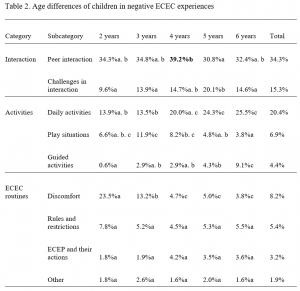 An article based on Progressive Feedback data Children’s negative experiences as a part of quality evaluation in early childhood education and care has been accepted for publication in the journal Early Child Development and Care. Children’s evaluations have been used in Progressive Feedback since 2011. In the article, children’s views in evaluating early childhood education is central. The data consists of 5 439 child interviews conducted by the children’s parents and guardians. Peer relations are central to children and difficulties in peer interaction are central to all children in every age group. Children’s views provide essential first hand experiences. Processing children views between adults help the staff and parents to consider children’s point of view. Processing children’s views together with children provides an opportunity to practice interaction skills together with others. Additionally, children’s views help adults to consider children’s solutions. Furthermore, children’s evaluations help children to learn to impact their own lifes and also the shared commynity with others. Children’s experience in belonging together with other children is important. Four-year-old children reported most negative peer experiences. The negativity of daily activities increase as children grow older. Also adults’ guidance is experienced more negative as children grow older. For the smallest children the descriptions are often concrete descriptions of mental of physical discomfort. In the table can be seen the trends in children’s negative experiences as children grow older in early childhood education. The article can be accessed at https://www.tandfonline.com/doi/full/10.1080/03004430.2020.1801667.
An article based on Progressive Feedback data Children’s negative experiences as a part of quality evaluation in early childhood education and care has been accepted for publication in the journal Early Child Development and Care. Children’s evaluations have been used in Progressive Feedback since 2011. In the article, children’s views in evaluating early childhood education is central. The data consists of 5 439 child interviews conducted by the children’s parents and guardians. Peer relations are central to children and difficulties in peer interaction are central to all children in every age group. Children’s views provide essential first hand experiences. Processing children views between adults help the staff and parents to consider children’s point of view. Processing children’s views together with children provides an opportunity to practice interaction skills together with others. Additionally, children’s views help adults to consider children’s solutions. Furthermore, children’s evaluations help children to learn to impact their own lifes and also the shared commynity with others. Children’s experience in belonging together with other children is important. Four-year-old children reported most negative peer experiences. The negativity of daily activities increase as children grow older. Also adults’ guidance is experienced more negative as children grow older. For the smallest children the descriptions are often concrete descriptions of mental of physical discomfort. In the table can be seen the trends in children’s negative experiences as children grow older in early childhood education. The article can be accessed at https://www.tandfonline.com/doi/full/10.1080/03004430.2020.1801667.